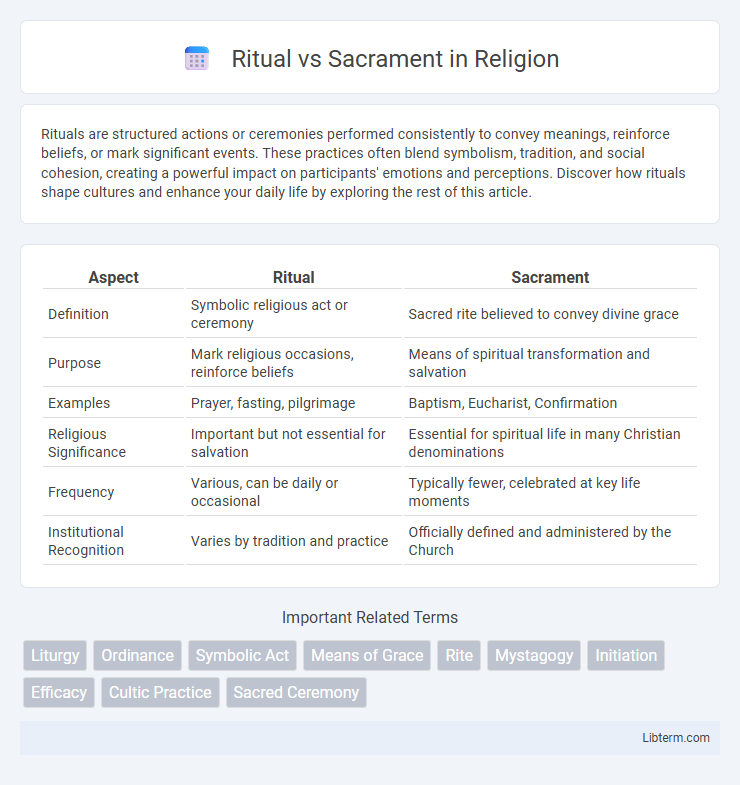Rituals are structured actions or ceremonies performed consistently to convey meanings, reinforce beliefs, or mark significant events. These practices often blend symbolism, tradition, and social cohesion, creating a powerful impact on participants' emotions and perceptions. Discover how rituals shape cultures and enhance your daily life by exploring the rest of this article.
Table of Comparison
| Aspect | Ritual | Sacrament |
|---|---|---|
| Definition | Symbolic religious act or ceremony | Sacred rite believed to convey divine grace |
| Purpose | Mark religious occasions, reinforce beliefs | Means of spiritual transformation and salvation |
| Examples | Prayer, fasting, pilgrimage | Baptism, Eucharist, Confirmation |
| Religious Significance | Important but not essential for salvation | Essential for spiritual life in many Christian denominations |
| Frequency | Various, can be daily or occasional | Typically fewer, celebrated at key life moments |
| Institutional Recognition | Varies by tradition and practice | Officially defined and administered by the Church |
Defining Ritual and Sacrament
Rituals are structured actions or ceremonies performed according to cultural or religious customs, often symbolizing significant beliefs or transitions. Sacraments, specifically in Christian traditions, are sacred rites instituted by Christ that convey divine grace, such as baptism and the Eucharist. While all sacraments are rituals, not all rituals hold sacramental significance, as sacraments uniquely function as visible signs of inward spiritual reality.
Historical Origins of Rituals and Sacraments
Rituals have ancient historical origins rooted in prehistoric human societies, serving as symbolic actions to communicate with the divine or mark significant life events. Sacraments, specifically within Christian theology, developed during the early centuries of the Church as formalized sacred rites believed to convey divine grace, influenced by Jewish ceremonial traditions and Greco-Roman practices. The evolution of sacraments reflects theological codification between the 2nd and 7th centuries, distinguishing them as essential, outward signs instituted by Christ for spiritual efficacy.
Key Differences Between Rituals and Sacraments
Rituals are symbolic actions performed to convey cultural or religious meanings, often repeated and varying across traditions, while sacraments are specific rites instituted by a religious authority believed to impart divine grace. Sacraments typically require a formal ordination or authorization and are essential to a faith's theological framework, such as baptism or Eucharist in Christianity. Rituals may include sacraments but also encompass a broader range of ceremonial acts without necessarily involving spiritual transformation or divine mandate.
The Role of Belief and Intention
Belief and intention fundamentally shape the significance of rituals and sacraments, as rituals often serve as symbolic actions that gain meaning through the participant's personal faith and intention. Sacraments, in many religious traditions such as Christianity, are considered outward signs instituted by divine authority, where belief in their sacred efficacy and intention to receive grace are essential for their spiritual effectiveness. The interplay of belief and intention transforms simple ceremonial acts into profound expressions of faith, fostering a deeper connection between the individual and the divine.
Symbolism in Rituals vs. Sacraments
Rituals employ symbolic actions and objects to convey cultural or spiritual meanings, often representing broader concepts or community traditions without necessarily invoking divine grace. Sacraments, as defined in Christian theology, are sacred rites instituted by Christ that use specific symbols--such as water in Baptism or bread and wine in the Eucharist--to impart divine grace and establish a direct spiritual connection with God. The symbolism in sacraments is both tangible and efficacious, signifying and effectuating sacred realities beyond mere representation found in general rituals.
Examples from Major World Religions
Rituals such as Hindu puja, Buddhist meditation ceremonies, and Islamic Salat exemplify structured practices aimed at spiritual engagement, while sacraments like Christian baptism, Eucharist, and Catholic confirmation represent sacred rites believed to confer divine grace. In Judaism, rituals include Passover Seder and Bar/Bat Mitzvah, contrasted with the sacramental aspects of marriage and circumcision seen as covenantal acts. These practices highlight the distinction where rituals focus on symbolic acts within a belief system, and sacraments emphasize ordained, grace-bestowing ceremonies integral to faith identity.
Social and Community Functions
Rituals foster social cohesion by bringing community members together to participate in shared symbolic actions, reinforcing collective identity and cultural values. Sacraments, as sacred rites within religious traditions, serve to strengthen communal bonds by publicly affirming faith and integrating individuals into the spiritual community. Both function as vital mechanisms for social continuity, creating a sense of belonging and collective purpose among participants.
Rituals and Sacraments in Modern Practice
Rituals in modern practice serve as symbolic actions that reinforce community bonds and personal beliefs, varying widely across cultures and religions without necessarily invoking divine grace. Sacraments, particularly within Christian traditions, are considered sacred rites instituted by Christ that confer spiritual grace and are essential for faith observance. Contemporary religious communities often blend rituals and sacraments, adapting ancient practices to modern contexts to maintain spiritual significance and cultural continuity.
Psychological and Spiritual Impact
Rituals foster psychological grounding by creating consistent symbolic actions that enhance emotional stability and community belonging, while sacraments provide a structured spiritual experience believed to convey divine grace and spiritual transformation. The psychological impact of rituals often includes stress reduction and identity reinforcement, whereas sacraments aim to deepen faith connection and spiritual renewal. Both practices influence cognitive and emotional well-being by integrating sensory engagement and sacred meaning, promoting holistic mental health and spiritual growth.
Conclusion: Integrating Ritual and Sacrament
Integrating ritual and sacrament enhances spiritual experience by combining symbolic actions with divine grace, fostering deeper communal and personal faith connections. Rituals provide structure and meaningful repetition, while sacraments convey sacred significance and spiritual transformation. Together, they create a holistic approach to worship that enriches religious practice and spiritual understanding.
Ritual Infographic

 libterm.com
libterm.com